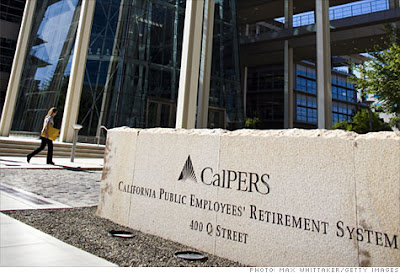Calpers and Risk: Together Forever?

Kit Roane of Fortune reports, Calpers and risk: Together forever? (HT: Bill Tufts, click on link for full article): Before clocking a $100 billion loss in early 2009, the California Public Employees' Retirement System, known as Calpers, had the swagger of a hedge fund and the certainty of a saint. Other pension funds followed its lead, loading up on leverage, investing in unrated CDOs, shoving money into high-priced private equity deals and barreling into commodities and real estate. The question now is whether a loss of nearly 40% of its market value -- the worst loss in the system's 77-year history -- has brought Calpers sufficiently back down to earth to avoid another such debacle, and whether other chastened pension systems have followed suit. In truth, not all of the evidence of a rebirth at Calpers is comforting. And in the case of some other underfunded pension funds, their latest financial bets look downright scary. "Some pension plans are evidently ho...




